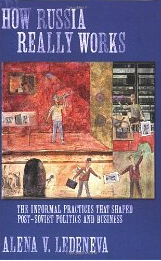 Alena Ledeneva is an intrepid Russian-born professor now teaching in Great Britain, who conducted in-depth interviews with 50 respondents between 1997 and 2003 to understand the “rulebook” of the post-Soviet Russian economy as it is actually played out. How Russia Really Works is a fascinating account of the problems of modernization from a failed centralized “planned economy” in which no one, except the power elite, was invested, to a market economy for many who would find the terms “business ethics” or “business law” oxymoronic. However, the problems predated the Soviet state.
Alena Ledeneva is an intrepid Russian-born professor now teaching in Great Britain, who conducted in-depth interviews with 50 respondents between 1997 and 2003 to understand the “rulebook” of the post-Soviet Russian economy as it is actually played out. How Russia Really Works is a fascinating account of the problems of modernization from a failed centralized “planned economy” in which no one, except the power elite, was invested, to a market economy for many who would find the terms “business ethics” or “business law” oxymoronic. However, the problems predated the Soviet state.
Ledeneva cites Sergei Witte, the progressive prime minister who served at the end of the nineteenth century, “’I am not in the least afraid of foreign capital, since I consider it is in the interests of our country…What I am afraid of is just the opposite, that our way of doing things has such specific characteristics, so different from the way things are done in civilized countries that not many foreigners will want to do business with us.’” (p. 115)
Ledeneva’s book is not about only about economics but applies to the extra-legal “rules” of politics, journalism and
all other aspects of life. Any Westerner who is interested in understanding Russia, investing in Russia, or living in Russia would find this account fascinating and worthwhile.
Whereas blat (the system of using interpersonal relationships to gaining access) was the primary method for citizens to obtain the necessities of life in the Soviet planned economy, the informal economy has become much more sophisticated as businesses, rather than individuals, devise various schemes to manipulate the environment to survive.
To help the reader understand, laws have not kept up with the realities in Russia. Often the laws are contradictory or
block getting anything done. Because it is so common to work around the law, bribes are common. There is rarely law enforcement unless a directive is given from above because someone has become a thorn in one’s side. A judge will adjudicate based on the directives of the politician in power. Corruption is rife through the system. There is little respect for “the law.” It reminds me of a story Vera told me about a Japanese transportation expert being invited to help find solutions to the traffic problems in Moscow. According to Vera, he announced that no solution would work because Russians have no respect for rules, so why bother implementing a system.
Ledeneva focuses on the expertise and know-how of the players in the game of business, including respondents from four major geographic areas and from a number of different backgrounds. There is a challenge in explicating rules of a game in which there are no “rules,” just
constantly shifting strategies to make more money, win more influence, and weaken one’s competitors.
The “informal practices” that have developed “compensate for defects in the formal order while simultaneously undermining it.” (p. 11) The information gleaned from these interviews is a treasure trove for anyone puzzling over the new Russia. She writes about “black piar” (slanderous PR ) and kompromat (information which can lead to reputation ruin).” Fact-checking is not part of the Russian journalistic culture. The threat of kompromat can be enough for political leverage. There are many ways elections are influenced in Russia that would make US negative political campaigns seem mild.
We asked Vera about her reaction to Ledeneva’s axioms that follow and she agreed with them completely.
“Axioms of Post-Soviet business life”
• All firms work without profit.
• All firms keep double books.
• One has to share profits through payouts.
• One has to respect the informal order.
• One has to make and keep friends.
• One should avoid dealing with formal institutions by reaching informal agreements with their representatives.
Reading this book reminded me of what it might have been like to interview the fictional participants in Lord of the Flies. I respect Vera and Alisa all the more for getting out of Russia with moral integrity intact. It is testimony to Vera’s resilience that she was able to function within such a system and to survive to tell the story.